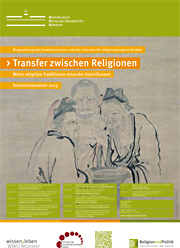âWhen religious traditions influence one anotherâ
Lecture series investigates the transfer between religions from antiquity until today

In the summer semester 2015, the lecture series of the Cluster of Excellence âReligion and Politicsâ and Centre for Religious Studies (Centrum fÞr religionsbezogene Studien, CRS) deals with the âTransfer between religions. When religious traditions influence one anotherâ. The interdisciplinary series will start on 14 April and discuss how numerous forms of influence and of the transfer of religious and cultural traditions occurred between religions of diverse cultural regions and historical epochs from late antiquity until the present day. Topics range from multi-religious identities and the Christian kabbalah to the reception of Platonism in Abrahamic religions and the reception of Hindu concepts in the West and vice versa. The lectures will be held on Tuesdays from 6.15 to 7.45 pm in lecture theatre F2 of the FÞrstenberghaus at Domplatz 20-22 in MÞnster. The lecture series is organised by the Clusterâs project group âTransfer between world religions: adoption â transformation â dissociationâ and by the CRS.
Prof. Dr. Regina Grundmann, Judaist and coordinator of the project group, explains, âFrom antiquity until the present, numerous forms of influence and of the transfer of religious and cultural traditions occurred between religions of diverse cultural regions â be it in oral, written, graphical or practical ritual form.â Furthermore, representatives of different religions frequently received the same philosophical and scientific ideas and concepts, which thus brought about common bodies of traditions â but also culturally different interpretations. These processes of exchange and reception developed in various ways and triggered further religious and cultural dynamics. âAs the reference to the âownâ tradition usually serves as a dissociation from other religious communities, the development of these processes of exchange and reception was not always purely positive or perceived as such.â
The public lecture series traces the diverse forms of the transfer of traditions from late antiquity until the immediate present. Representatives from various disciplines will contribute, i.e. of religious studies, Byzantine studies, Indology, Islamic studies, Judaism, sinology, theology and philosophy. (exc/vvm)
Programme
| 14.04.2015 | Perry Schmidt-Leukel, MÞnster | Warum mit nur einer Religion leben? Anmerkungen zum PhÃĪnomen multi-religiÃķser IdentitÃĪt |
| 21.04.2015 | Joachim Gentz, Edinburgh | Das GroÃe Dao ist ohne Form, ohne Wesen und ohne Namen. Formen des Transfers zwischen Religionen im regulierten Pluralismus Chinas |
| 28.04.2015 | Angelika Neuwirth, Berlin | Traditionsbildung durch Textstrategie: der Weg der koranischen Gemeinde von Jerusalem nach Mekka |
| 05.05.2015 | Katrin Kogman-Appel, Beer Sheva | Buchkultur und Bildkultur in der mittelalterlichen jÞdischen Gesellschaft: Kulturaustausch zwischen Christen, Juden und Muslimen |
| 12.05.2015 | Andreas Speer, KÃķln | Philosophie und Wissenschaft als gemeinsames Erbe der abrahamitischen Religionen im Mittelalter |
| 19.05.2015 | Annette Wilke, MÞnster | Rezeption hinduistischer Konzepte im Westen und westlicher Konzepte im Hinduismus |
| 02.06.2015 | Wilhelm Schmidt-Biggemann, Berlin | Politische Theologie der christlichen Kabbala. Der Fall Guillaume Postel (1510â1581) |
| 09.06.2015 | Michael Zimmermann, Hamburg | Vom Nicht-Selbst zur Buddha-Natur? Buddhistische Vorstellungen vom Wesen des Menschen in Wechselwirkung mit anderen indischen Religionen |
| 16.06.2015 | GÃķrge Hasselhoff, Dortmund | Ein neues Bild vom Judentum? Maimonides im Paris des 13. Jahrhunderts |
| 23.06.2015 | Jens Halfwassen, Heidelberg | Warum ist die negative Theologie fÞr monotheistische Religionen attraktiv? Ãberlegungen zur Platonismusrezeption in den abrahamitischen Religionen |
| 30.06.2015 | Michael GrÞnbart, MÞnster | Reliquientransfer â Verbindendes zwischen den christlichen Welten des Mittelalters? |
| 07.07.2015 | George Sabra, Beirut | Christian-Muslim Dialogue in the Middle East: Tradition and the Exigencies of Context |
Summer semester 2015
Tuesdays,6.15 bis 7.45 p.m.
Lecture hall F1 at the FÞrstenberghaus
Domplatz 20-22
48143 MÞnster

